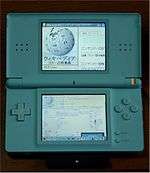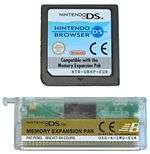Nintendo DS & DSi Browser
|
North American cover art | |
| Developer(s) |
Opera Software Nintendo |
|---|---|
| Initial release | |
| Platform | Nintendo DS |
| Type | Mobile web browser |
| Website |
www |
The Nintendo DS Browser (ニンテンドーDSブラウザー Nintendō Dī Esu Burauzā) is a version of the Opera web browser for use on the Nintendo DS, developed by Opera Software and Nintendo. The Nintendo DS Browser comes in separate versions for the Nintendo DS and the Nintendo DS Lite;[2] this is due to differing physical size requirements for the memory expansion cartridge included with the browser. The Nintendo DSi is incompatible with the Nintendo DS Browser, though a DSi compatible version of Opera 9.5, Nintendo DSi Browser (ニンテンドーDSiブラウザー Nintendō Dī Esu Ai Burauzā), is available free from the DSi Shop.
Launch
On February 15, 2006, the Opera Software company announced plans to develop a web browser for the Nintendo DS.[3]
The Nintendo DS Browser was released first in Japan on July 23, 2006 and it was released later in Europe on October 6, 2006 for £30 (the same as an ordinary DS game). The Australian release date was on January 18, 2007 and retailed for A$69.95. (~US$60)[4] However, in Australia, only the DS Lite version was released in stores; a limited stock of the DS Original version was only available directly through Nintendo Australia.
The North American release date was on June 4, 2007 for $29.99.[1] Like the Australian release, only the Lite version was available in stores, and the DS Original version was only available online in the US.[5]
Features

Nintendo DS Browser makes use of the Nintendo DS's touchscreen for input, with an on-screen keyboard as well as handwriting recognition and a stock of pre-set text (for example, the .com and .org top-level domains).
The browser can render pages in two modes, Small Screen Rendering (SSR) or Overview. In Small Screen Rendering mode, the contents of the page are displayed in a single column fitting the width of the screen - for example, a page featuring two columns of text side-by-side would be displayed as a single column, one after the other. In Overview mode, a scaled-down version of the page is displayed on the touchscreen with a small selection box which can be moved around using the stylus. The contents of the selection box are displayed on the top screen at their full size. This selection can be brought into the touchscreen to perform such actions as click on links or entering text in boxes.
The browser connects to the network through IEEE 802.11 Wi-Fi access points or hotspots using the built-in wireless capability of the Nintendo DS. While WEP encryption is supported, WPA encryption is not.
Nintendo has partnered with Internet security company Astaro to integrate web filtering technology into the Nintendo DS Browser. Called Astaro Parental Control, the technology acts as a proxy filter, providing the option of blocking inappropriate content.[6] This is provided free of charge and can be activated through a simple menu option.
The Nintendo DS browser supports JavaScript and SSL in web pages,[7] but does not support plugins like Adobe Flash, or bold text.[8] Due to limited system resources, most other dynamic media, such as videos or sound, will not work in the browser.
DS memory expansion pak

The Memory Expansion Pak, much like the Rumble Pak for the Nintendo DS is a "DS Option Pak". When inserted into a DS GBA slot, the Memory Pak adds 8MB of RAM to the DS and a memory management unit.
Two versions of the Memory Expansion Pack are available. One is compatible with both the DS and DS Lite, although the cartridge sticks out of the DS Lite. A smaller version is available which fits flush with the body of the DS Lite, and cannot be used with the original DS without modification. Two different Browser packages are available, one containing the large Expansion Pak, and one containing the Lite-only Expansion Pak. Availability varies by region - in Japan and Europe, both were available at launch, while in North America and other regions, the version containing the larger Expansion Pak is only available by mail order.
It has slight similarities to the Nintendo 64 Expansion Pak. The Nintendo DS Browser is the only official Nintendo DS software that requires this hardware, but it has been suggested that the expansion could be used for other software,[9] including optional graphical updates that would allow a better experience if the card is inserted, in addition to other games that could require the expansion. However, it has been utilized in various unofficial homebrew software, such as DSLinux. It has also been cloned as part of the EZ Flash 3-in-1 SLOT-2 device.
The Nintendo DSi, a newer model, no longer includes the Game Boy Advance slot (SLOT-2), so it cannot use the memory expansion pak. However, the DSi does have 16 MB of RAM, more than that of the original Nintendo DS (4 MB) and a Memory Expansion Pak (8 MB) combined. This additional memory is used by the DSi for its DSi Browser, which is not included with the system but can be downloaded for free from the DSi Shop. Tests have shown it to be faster than the DS Browser.[10]
Nintendo DSi Browser
| Developer(s) |
Opera Software Nintendo |
|---|---|
| Initial release | |
| Platform | Nintendo DSi (DSi Ware) |
| Type | Web browser |
| Website |
www |
An Opera browser was released as a free downloadable application for the Nintendo DSi. It was available since the DSi launched and is preloaded on newer Nintendo DSi's and all Nintendo DSi XL's. This version uses the Opera Presto 2.1 engine, which is more advanced and standards-compliant.
Standards compliance
The Nintendo DSi Browser passes the Acid1 test. It nearly passes the Acid2 test, except for fixed element positioning, resulting to two stray squares. It receives a 59% on the Acid3 test in Overview Mode and a 53% in Column Mode, although the page does not display properly in the latter.[11]
The Web browser has support for the HTML5 canvas object. To display images in a canvas, they must be cached in memory. Additionally, only the portion of the image in cartesian sector 2 may display at times, leading to unpredictable results.
Although the Web browser supports CSS opacity, its usage considerably slows the browser, especially when used with event-driven functionality like mouseOver and mouseMove.
There is support for character sets of Western (including diacritics), Japanese (hiragana, katakana, kanji), Cyrillic, Greek, mathematical symbols, and several universal symbols (male, female, musical staffs, numbered bullets, etc.). Bold and italic are not supported. The text shadow style is supported. Available font sizes are 6pt to 14pt, even sizes only.[12]
Critical reception
| Publication | Score |
|---|---|
| IGN | 3.5 out of 10 [13] |
Reviews for the Nintendo DS Browser were generally mixed. Many reviewers noted shortcomings such as extended loading times and lack of Flash support for audio and videos.
Despite criticism to the web browser itself, the reason of the slowness and the lack of features is the Nintendo's system limited hardware as the IGN review suggests.
In August 2007, the Nintendo DS Browser was quietly discontinued in North America.[14][15]
See also
References
- 1 2 "US Browser info". Nintendo of America. Retrieved 2007-06-04.
- ↑ 任天堂オンライン販売 [Nintendo Online Sales] (in Japanese). 1UP.com. July 27, 2006.
- ↑ "Giving gamers two windows to the Web: The Opera Browser for Nintendo DS" (Press release). Opera Software. 2006-02-15. Retrieved 2008-02-01.
- ↑ "AU date for DS Browser". nintendo.com.au.
- ↑ "Original DS browser available online and in stores y\". Gamespot.com.
- ↑ "A Nanny for your Nintendo DS". Astaro Corporation. August 8, 2006.
- ↑ Important Notes on compatibility | Nintendo DSi (XL) | Support | Nintendo
- ↑ Nintendo - Customer Service | Nintendo DS Lite - Nintendo DS Browser
- ↑ "DS Expansion Pak". Retrieved 2007-11-19.
- ↑ DS browser vs. DSi browser | Joystiq. Nintendo.joystiq.com (2009-02-23). Retrieved on 2013-08-23.
- ↑ "My Opera discussion on Nintendo DSi Browser". Retrieved 2009-06-29.
- ↑ "DS Opera SDK browser tests". Retrieved 2009-06-29.
- ↑ "IGN's Review". Retrieved 2008-02-15.
- ↑ Ponte, Christian (2007-08-27). "Nintendo DS Browser being discontinued in North America". The Tanooki. Retrieved 2008-03-10.
- ↑ "Nintendo DS Lite Browser". Amazon.com. Retrieved 2007-10-18.
External links
- ニンテンドーDSブラウザー DS Browser Japanese page
- DS Browser support American page
- DSi Browser American page
- DSi Browser support American page
- DS Browser European page
- DSi Browser European page
- DSi Browser support European page

